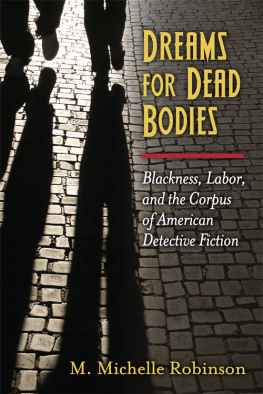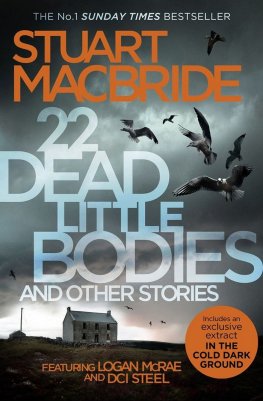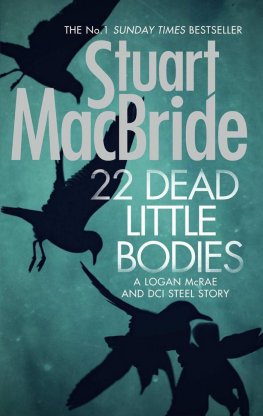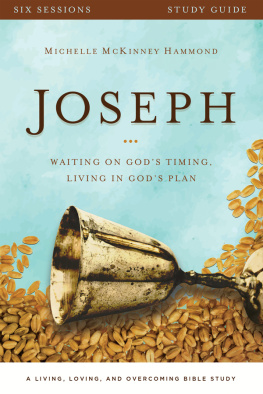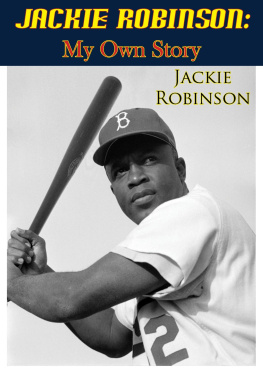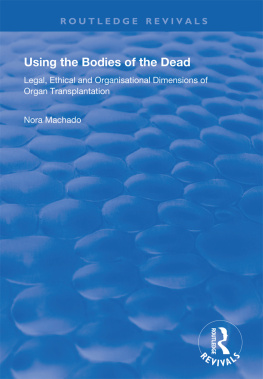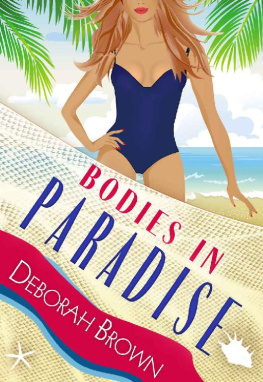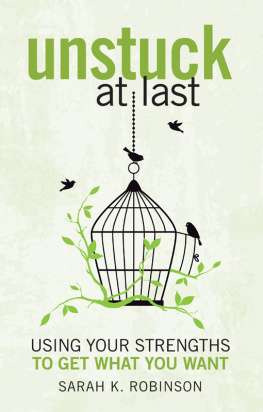Michelle Robinson - Dreams for Dead Bodies
Here you can read online Michelle Robinson - Dreams for Dead Bodies full text of the book (entire story) in english for free. Download pdf and epub, get meaning, cover and reviews about this ebook. year: 2018, publisher: University of Michigan Press, genre: Detective and thriller. Description of the work, (preface) as well as reviews are available. Best literature library LitArk.com created for fans of good reading and offers a wide selection of genres:
Romance novel
Science fiction
Adventure
Detective
Science
History
Home and family
Prose
Art
Politics
Computer
Non-fiction
Religion
Business
Children
Humor
Choose a favorite category and find really read worthwhile books. Enjoy immersion in the world of imagination, feel the emotions of the characters or learn something new for yourself, make an fascinating discovery.
- Book:Dreams for Dead Bodies
- Author:
- Publisher:University of Michigan Press
- Genre:
- Year:2018
- Rating:4 / 5
- Favourites:Add to favourites
- Your mark:
- 80
- 1
- 2
- 3
- 4
- 5
Dreams for Dead Bodies: summary, description and annotation
We offer to read an annotation, description, summary or preface (depends on what the author of the book "Dreams for Dead Bodies" wrote himself). If you haven't found the necessary information about the book — write in the comments, we will try to find it.
Dreams for Dead Bodies — read online for free the complete book (whole text) full work
Below is the text of the book, divided by pages. System saving the place of the last page read, allows you to conveniently read the book "Dreams for Dead Bodies" online for free, without having to search again every time where you left off. Put a bookmark, and you can go to the page where you finished reading at any time.
Font size:
Interval:
Bookmark:
 Page i
Page i 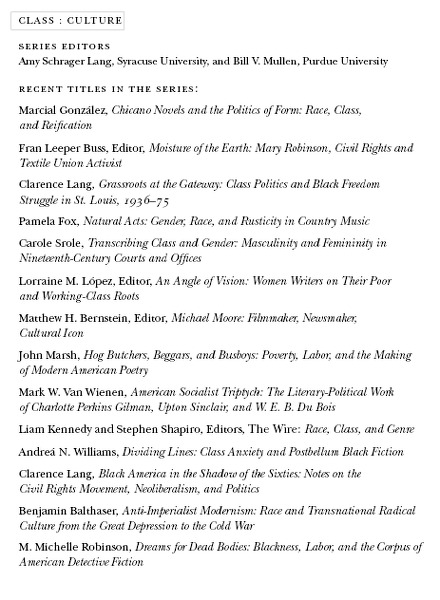 Page ii Page iii
Page ii Page iii M. Michelle Robinson
University of Michigan Press
Ann Arbor
Page ivCopyright 2016 by M. Michelle Robinson
All rights reserved
This book may not be reproduced, in whole or in part, including illustrations, in any form (beyond that copying permitted by Sections 107 and 108 of the U.S. Copyright Law and except by reviewers for the public press), without written permission from the publisher.
Published in the United States of America by the
University of Michigan Press
A CIP catalog record for this book is available from the British Library.
Library of Congress Cataloging-in-Publication Data
Names: Robinson, Michelle, 1979author.
Title: Dreams for dead bodies : blackness, labor, and the corpus of American detective fiction / Miriam Michelle Robinson.
Description: Ann Arbor : University of Michigan Press, [2016] | Series: Class : culture | Includes bibliographical references and index.
Identifiers: LCCN 2015041733 | ISBN 9780472119813 (hardback : acid-free paper)
Subjects: LCSH: Detective and mystery stories, AmericanHistory and criticism. | African Americans in literature. | Working class in literature. | Slavery in literature. | Work in literature.
Classification: LCC PS374.D4 R625 2016 | DDC 813/.087209dc23
LC record available at http://lccn.loc.gov/2015041733
A number of people have been important in the writing of this book. It is a great pleasure to express my gratitude to John T. Matthews and Charles Rzepka as well as Marilyn Halter, Nina Silber, and Roy Grundmann for their guidance. I am much indebted to the Institute of Arts and Humanities at the University of North Carolina at Chapel Hill for a Mellon Book Manuscript Workshop, and to Sean McCann and Robert Reid-Pharr, who graciously and generously participated. Eliza Richards, Sharon Holland, Priscilla Wald, John McGowan, and Ian Baucomb also provided words of encouragement and much-appreciated feedback that guided my revisions. Librarians at the John Hay Library at Brown University helped me navigate the Rudolph Fisher Papers. Sohini Sengupta at the Center for Faculty Excellence and Jennifer Ho offered a lift when the challenges of writing a book proposal seemed insurmountable. I am also indebted to the two anonymous readers for the University of Michigan Press who provided extensive and valuable comments on the manuscript. And I am so appreciative of LeAnn Fields and Christopher Dreyer at the University of Michigan Press for their enthusiasm and for their dedication to publishing this book.
This work would not have been possible without the support of Joy Kasson, Bernie Herman, and a long roster of my magnificent colleagues in American Studies and elsewhere at UNCChapel Hill. I am truly grateful to Tim Marr and Rachel Willis for their emboldening intellectual and moral support. Jenny Tone-Pah-Hote, Ben Frey, Laura Halperin, Heidi Kim, Pat Parker, Angeline Shaka, Heidi Kim, Ariana Vigil, Nadia Yaqub, Morgan Pitelka, and Rachel Pollock were great friends and sometimes disciplinarians-by-proxy during this process, as were the optimists Joe Campana, Chris Holmlund, and Michael Mallory.
My thanks go to Deedie Matthews, Ian Morse, Mariah Voutilainen, and the rest of my close and extended family for their unwavering support. Finally, I am deeply grateful to my parents, Brooks Robinson and Wylma Samaranayake-Robinson. I am lucky to be their daughter.
Page viii Page 1She was sitting on the terrace with Prousts Remembrance of Things Past open in her lap, but instead of reading she was looking across her sunny acres with a dreamy expression.
If I may be so bold as to ask, what are you thinking, madame? I asked.
About sausage.
What about sausage, madame?
About how good it is.
It made me happy to see her happy, and the hogs were happy to see us both happy.
Chester Himes, The End of a Primitive
In Chester Himess book The End of a Primitive, an African American author named Jesse Robinson dreams of reading a book titled Hog Will Eat Hog, a soft sweet lyrical and gently humorous account of a cook who discovers one need not slaughter hogs to make sausage (193). Instead, he makes an arrangement with his pigs: each day they will volunteer some quantity of sausage neatly stuffed in their intestines, which the man has merely to collect and turn over to his customers. This mutually agreeable bargain is botched, however, when a single hog among them claims he is all out of sausage and refuses to turn over his daily portion. I knew by his hang-hog expression and the guilty manner in which he avoided my eyes, the narrator explains, that the sausage manufacturers had bribed him:
But it is true, he contended. Besides which I have no more guts.
Would you rather be slaughtered and butchered by the sausage manufacturers, or give us, your friends, a little bit of sausage each day? I asked bluntly.
I dont know why I hate you so when youve been so good to me, he squealed pathetically, lard drops streaming from his little hog eyes. (194)
Page 2 It is a curious pact, to be sure, between a high-strung hog, some sort of sausage broker or cook, and a Jimmy Deanloving aesthete, which turns sour when the pig cries lard. But it is also a heavy-handed fable in a novel about a bitter African American novelist. A writer is expected to generate a sort of formula fictionagglutinate, mass produced, serialized, even pulpto suit the public, we are led to believe; he is supposed to make hash of his work to fit specs negotiated by a publisher with an axe, so to speak, up against the authors neck. Or perhaps the livestock and, in particular, that pathetic pig, is meant to recall the transformation of the body into a commodity, the extraction of a black mans blood and guts for anothers profitslavery redacted, an all-American edition of Remembrance of Things Past. Or it is some combination of the two.
Long before Himes became celebrated as an author of hard-boiled detective fiction, his first, gorgeous, semibiographical novel, Yesterday Will Make You Cry, was thoroughly bowdlerized: third-person narration was swapped for first; its sober prison story was sanctified with slang (the 1972 Signet Edition called its protagonist, James Monroe, a cool cat, and described the book as a ruthlessly honest novel of a young blacks agonizing discovery of his own emotions, his own identitynever mind that the main character was white); and it was rechristened as the more lurid Cast the First Stone (qtd. in Van Peebles 19). This was swinging of the pendulum towards pulp, laments Melvin Van Peebles, who writes, What stomach-turning irony, forced to mutilate your work and then, adding insult to injury, having that mutilation become the map to greater fame and fortune (1920).
Whether the subject of Jesse Robinsons dream is a prcis of Himess scuffles with the literary establishment or a cartoon adaptation of Dialectic of Enlightenment is of less consequence, however, than that the subject of the dream is the subject of a book. And a most unusual one since, if we take its allegorical freight seriously, Jesse dreams of a book that capitulates the conditions of its own production, and of its failure to give the goods. It is a book that is, quite literally, full of itself (and of its failure to be itself)and therefore quite appropriately titled
Font size:
Interval:
Bookmark:
Similar books «Dreams for Dead Bodies»
Look at similar books to Dreams for Dead Bodies. We have selected literature similar in name and meaning in the hope of providing readers with more options to find new, interesting, not yet read works.
Discussion, reviews of the book Dreams for Dead Bodies and just readers' own opinions. Leave your comments, write what you think about the work, its meaning or the main characters. Specify what exactly you liked and what you didn't like, and why you think so.

